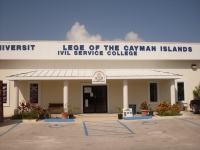Archive for July, 2009

RCIPS still at UCCI Brac campus
 (CNS): The Cayman Brac RCIPS has been based in the UCCI building opposite the District Administration building in Stake Bay ever since Hurricane Paloma hit the Brac about 8 months ago, when the police station at the Creek was heavily damaged. The roof was torn off and the interior of the building received a lot of damage. To this day, the station is still in its broken state. The UCCI campus has a total of 6 class rooms, 2 of which the RCIPS are currently occupying.
(CNS): The Cayman Brac RCIPS has been based in the UCCI building opposite the District Administration building in Stake Bay ever since Hurricane Paloma hit the Brac about 8 months ago, when the police station at the Creek was heavily damaged. The roof was torn off and the interior of the building received a lot of damage. To this day, the station is still in its broken state. The UCCI campus has a total of 6 class rooms, 2 of which the RCIPS are currently occupying.
Obviously this decreases the amount of space available for classes, but it wasn’t that much of a problem for the academic year just passed, according to Campus Director, Martin Keeley. “The upcoming year however is expected to be a lot busier and the space issue will definitely pose a problem” he said.
Keeley said, “In September we are going to have about 50 new students coming in, added to the 30 or so Civil Service students and the 100 second year students, and that’s about 180 students.” He noted that one classroom can hold about 15 people.” While it’s understood that classes won’t happen all at once, 4 rooms amongst 180 students just isn’t enough. “We will have a problem in September. We need to solve it,” were the words of a concerned Keeley.
 According to a police spokesperson, the RCIPS themselves are not responsible for the funding of the repair. However, the government has earmarked some money for repairing the police station in the Creek. Floor plans have already been drawn up and construction is believed to begin shortly. CNS understands that the building isn’t owned by government. We tried to contact government on the matter of whom it belongs to and if the government bought it, but have not yet received a reply.
According to a police spokesperson, the RCIPS themselves are not responsible for the funding of the repair. However, the government has earmarked some money for repairing the police station in the Creek. Floor plans have already been drawn up and construction is believed to begin shortly. CNS understands that the building isn’t owned by government. We tried to contact government on the matter of whom it belongs to and if the government bought it, but have not yet received a reply.
Currently the RCIPS have a Service Level Agreement with UCCI and they pay the college $4,200 per month for the use of the space plus utilities. The RCIPSs suffer from lack of space as well. There aren’t any holding cells and the prisoners must be kept around until they can get on a flight to Grand Cayman. While they have areas for evidence and equipment, there isn’t enough space for it all.
The Police Station is still damaged and it seems as if nothing is being done to it. Save for a few pieces of tarpaulin no repairs have been done. It seems that repairs aren’t going to be finished anytime soon and it is highly doubtful that the RCIPS will move out before the new semester begins.

Immigration guilty of maladministration, OCC finds
 (CNS): The Immigration Department’s tardiness in giving a refund to a small business was beyond acceptable limits even by relaxed standards and amounted to maladministration, the Office of the Complaints Commissioner (OCC) found. And in a Special Report following an initial investigation, the OCC further found that the Immigration Department had not complied with a recommendation made by Complaints Commissioner Dr John Epp that properly documented refund requests should be paid by the department within 30 days.
(CNS): The Immigration Department’s tardiness in giving a refund to a small business was beyond acceptable limits even by relaxed standards and amounted to maladministration, the Office of the Complaints Commissioner (OCC) found. And in a Special Report following an initial investigation, the OCC further found that the Immigration Department had not complied with a recommendation made by Complaints Commissioner Dr John Epp that properly documented refund requests should be paid by the department within 30 days.
The original investigation followed a complaint in September 2007 registered by a small business which had been waiting more than four months for the refund of a deposit of CI$2,000, according to a release from the OCC.
At that time of the investigation, the Immigration Law stated that employers had to deposit a sum of money with the Immigration Department to cover the possible repatriation of work permit holders and their dependents. This security deposit, which varied depending on the worker’s country of origin, was refundable once he or she departed the Cayman Islands.
Immigration processes request for all refunds, including those associated with work permit applications, while the Treasury Department generates the cheque for the Immigration to post.
While the complainant was refunded within the timeframe recommended by the Commissioner following his investigation, a second recommendation, that the department’s officer responsible for all refunds from Immigration be instructed to process those due within 30 days of properly documented requests, has not been complied with, the release said.
Refunds from the Immigration Department are certainly made, the OCC found, and there is an informal target of completing a least one batch of refund cheques each week. However, according to the OCC, there are no consequences for inefficient service, and there appears to be a laissez-faire attitude built into the system. Responsible governance should have expectations and targets clearly stated, and it is the view of the OCC that these targets should accord with its recommendation.
The monitoring of the second recommendation began in December 2007. The OCC granted the Immigration Department a six-month period with which to comply with the recommendation, after which an audit, involving interviews and a review of documents and records, would establish compliance.
The OCC monitored a sample of 37 requests (out of a total of 350) made during May 2008, representing about 10% of the total for the month. When they returned on 13 August, only 10 (27%) had been processed within 30 days, while the slowest had taken 72 days.
OCC staff also looked at temporary work permits for the month of June 2008. Even though such refunds were supposedly processed much quicker, thanks to the use of a different system, only 80 (66.7%) of the 120 refund requests were processedwithin 30 days. The largest timeframe for such cases was 52 days.
The reasons given as to why refunds were taking so long included the existence of a multi-source intake framework; a complex refund process; the use of aged and imperfect software; difficulties interacting with Treasury; the Department’s workload volume and working conditions in general; the complexity of the job; a lack of resources; and the lack of clearly stated internal performance targets.
However, the OCC found that it was unacceptable that such a state of affairs had been allowed to exist.
While the accounting system uses a complex programme (IRIS), which can be unavailable from time to time and which can crash in the middle of the entry of data for a cheque batch order, such technical problems should not be considered as a major contributory factor to refund delays, the OCC found. Similarly, the process of assessing and approving a refund was in need of redesigning. In addition, the OCC did not accept that the Financial Department was short staffed, but if so, it should take action to fill the post of Accounts Officer.
A draft copy of this report was given to Chief Immigration Officer for his comment in the event that he took issue with any of the findings of fact or conclusion, but no response was received.
“In accordance with the Complaints Commissioner Law, if we find that inadequate action has been taken to carry out the recommendation of this Office, a special report must be laid before the Legislative Assembly,” explained Epp.
“It is particularly disappointing that there was little effort to comply with our recommendations. The work of this Office provides government departments with an opportunity to improve their service to the public, which should be the aim of all department heads. Cooperation with our investigation is in the best interest of both the public and department staff,” Dr Epp added.
The OCC is located on the 2nd floor, 202 Piccadilly Centre, Georgetown, Grand Cayman, phone number (345) 943 2220. The website is www.occ.gov.ky.

Brac Athletic Club Success
(CNS): The Brac Elite Athletic Club (Track & Field) is one of the most successful sports clubs on Cayman Brac. This is the output of dedicated members and hard training. Athletes of the club have won multiple medals and titles in and outside of the Cayman Islands. Out of all members, it is safe to say that Madison Bush, age 11, has been most successful. She is a 4 time medalist at USA Track and Field Youth National Championships and has been awarded the title ‘Female Track and Field Athlete of the Year 2008’ by the Sports Association of the Sister Islands (SASI). Madison has also competed in the Junior Olympics twice.
Other accomplishments of the the club are Andrew Frederick, who earned SASI’s ‘Male track athlete of the year 2008’ and competed in Carifta 2009; Jonathon Frederick was Under-14 Champion in shot put, discuss, and javelin for the Cayman Islands; and Ameilia Gillispie, who preforms several events, represented Cayman Islands at CAC Junior Championships 2009 taking home a 3rd place medal in High Jump. All are trained by Flynn Bush. Flynn is a serious coach in T&F and was appointed as a National Coach strictly for the Island Games in the Aland (pronounced Oh-land) islands.
Success did not come easy. The athletes train a total of five days a week at 6am on Mondays and Wednesdays and at 4pm on Mondays, Tuesdays, Thursdays and Fridays. Each athlete also has to sign a contract which requires them to commit to training consistently, working hard on track and at school, to be respectful of others and themselves, and to produce result that are competitive when compared to top tier athletes of their own age in the USA and region. The Athletic Club Started with 16 members in September 2008. Out of the group, 7 preserved. Out of the seven athletes, 4 have kept this contract while 3 are on probationary status.
Hurricane Paloma took a toll on the athletes by disrupting training for 2 weeks in November 2008. Even the athletes homeless and important equipment lost, they still resumed training vigilantly. It’s this kind of dedication that brings the BEAC the success it’s already attained and much more is expected in the future.

Police net dozens of drivers for traffic violations
 (CNS): In the last week police have caught 70 drivers breaking the law in the Eastern Districts with ‘speeding’ accounting for over half the offences detected, the RCIPS said yesterday (7 July). Officers reported that 42 people were caught driving above the prescribed speed limit and 23 people were caught for not wearing the seatbelts. The remaining five offences were for failing to display a current coupon, 4 drivers and one person was caught driving with a defective light.
(CNS): In the last week police have caught 70 drivers breaking the law in the Eastern Districts with ‘speeding’ accounting for over half the offences detected, the RCIPS said yesterday (7 July). Officers reported that 42 people were caught driving above the prescribed speed limit and 23 people were caught for not wearing the seatbelts. The remaining five offences were for failing to display a current coupon, 4 drivers and one person was caught driving with a defective light.
“Public safety is our primary concern and it is a disappointment to see so many people breaking the traffic law,” said Area Commander, Chief Inspector Richard Barrow. “The rules of theroad are in place to help keep all road users safe and drivers should bear that in mind at all times.”
Barrow also called on dump truck drivers to remember that their loads need to be covered at all times and to be mindful of the narrow roadways in BoddenTown. “When travelling through the Eastern Districts, dump truck drivers should be mindful of the noise they can produce. I ask all drivers to slow down, ensure their loads are covered and not use their brakes in a way that will cause annoyance to the community,” he said.
CI Barrow stressed that officers will continue to monitor the roads and any traffic violators will be dealt with accordingly, stating that preventing collisions and ensuring public safety is a top priority.
Anyone with information about crime taking place in the Eastern Districts should contact their local police station or Crime Stoppers on 800-8477 (TIPS). All persons calling Crime Stoppers remain anonymous, and are eligible for a reward of up to $1000, should their information lead to an arrest or recovery of property/drugs.

Murder trial opens with key prosecution witness
(CNS): William David Martinez-McLaughlin (32) appeared in Grand Court this morning to face trial for the murder of Brian Rankine last year. Rankine’s naked body was found in a parking lot around midnight on 16 May 2008 in McField Lane, George Town. A jury of eight women and four men heard first from Jason Hinds, the prosecution’s primary witness, who told the court he was with both McLaughlin and the deceased on the night the victim was murdered. Hinds testified that he saw McLaughlin hold a cutless (machete) over his head and chop at the victim.
Hinds, who has pleaded guilty to being an accessory after the fact of murder and is awaiting sentencing, is the Crown’s primary witness. After a short opening statement from Solicitor General Cheryll Richards, where she explained that Crown’s case was based on Hinds’ testimony, Hinds took the stand and told the court that he and McLaughlin had been work colleagues for some time at a local plumbing firm.
He told the court that he and McLaughlin had been together on the night of 16 May and described the events. Hinds said that he and the defendant had met the victim in a bar that night in East End and had both drove with him in their work van to George Town. Hinds related to the court an exchange which took place outside the van between the deceased and McLaughlin when the three arrived in McField Lane in George Town that started with an argument over what he said looked like a white piece of paper with something in it.
Hinds said he saw McLaughlin grab the victim by the neck and drag him towards some bushes. The witness described a scuffle between the two men and then said that as he went over towards them they both stumbled to the floor with the victim on his belly and McLaughlin on top of him holding his neck.
Hinds testified that he attempted to pull McLaughlin from the man by grabbing his arms from behind and telling him to let go of the victim but had felt a pointed metal object in his hand and moved away.
“I got scared and went back to the van,” Hinds told the court. “I thought he might try to stab me with what he had in his hand.” He described how he could no longer see both of them from his van but that McLaughlin rushed back and pulled a cutless from behind the passenger seat and a white plastic bag and went back to the man (Rankine).
“I saw him start chopping,” Hinds told the court and described McLaughlin raising the cutless above his head. “He was chopping very fast, chopping like he was crazy and not hisself.”
Hinds said he couldn’t see both men but just the chopping action. “I was terrified,” he told the court and described how he stayed in the van for a while before he pulled open the door and ran to see if he could stop him.
“When I reached over there he was pulling off the man’s clothes and stuffing them in the bag,” Hinds stated. He told the court that he held McLaughlin’s wrists and told him to leave the man alone and McLaughlin did not say anything.
Hinds went on to describe how he had driven McLaughlin home to East End but had stopped at two locations on the way home to allow McLaughlin to dispose of the cutless and clothes and how he was afraid he too would be attacked. He also said that he buried his own clothes the next morning in his own garden as they had blood on them and cleaned his boots with bleach before going to collect McLaughlin and going to work. He described how the two men were then arrested and how he had eventually told the police everything and taken them to the murder scene and the places where McLaughlin had disposed of the clothes and the weapons.
Following his account of the night, Mark Tomassi, lead counsel for the defence, began a short cross examination before the day’s proceedings were adjourned. Focusing on the truth and honesty, he asked Hinds if he believed that burying his own clothes and cleaning his boots were honest or dishonest acts.
Hinds indicated his confusion and said that he had been scared.
The trial before Justice Alex Henderson is expected to last nine days and Hinds continues on the stand today (8 July).

Goal posts move on TIEAs
 (CNS): On the eve of Leader of Government Business McKeeva Bush’s appointment to sign Cayman’s 11th Tax Information Exchange Agreement, this time with the Netherlands, two OECD countries have indicated that the proverbial goal posts may have shifted once again when it comes to measuring cooperation on fighting global tax evasion. According to reports from a summit in Evian, France, British Prime Minister Gordon Brown and French President Nicolas Sarkozy have called for a March 2010 deadline for sanctions against tax havens that fail to bring their transparency up to international standards.
(CNS): On the eve of Leader of Government Business McKeeva Bush’s appointment to sign Cayman’s 11th Tax Information Exchange Agreement, this time with the Netherlands, two OECD countries have indicated that the proverbial goal posts may have shifted once again when it comes to measuring cooperation on fighting global tax evasion. According to reports from a summit in Evian, France, British Prime Minister Gordon Brown and French President Nicolas Sarkozy have called for a March 2010 deadline for sanctions against tax havens that fail to bring their transparency up to international standards.
The UK and France have indicated their desire to see country by country reporting and that twelve agreements alone are not enough to rescue countries from the infamous ‘grey list’.
As Bush prepared to sign a TIEA in Holland on Wednesday, 8 July, in an effort to reach the OECD standard of twelve tax agreements to remove Cayman from the ‘grey list’ and the stigma of an un-cooperative jurisdiction, both France and the UK said they will remain vigilant in ensuring that the 42 countries still on the OECD ‘grey list’ meet their commitment to apply international standards for the exchange of tax-related information.
France and the UK indicated that they will combine efforts to reinforce the coherence and effectiveness of international action over tax evasion. “We agree that the threshold of 12 tax information exchange agreements should be seen as a starting point in the move towards greater tax transparency. If progress stalls we will expect the threshold to rise above 12, bringing those who have not made further progress back into the ‘grey list.”
Former chair of the Cayman Islands Monetary Authority and offshore expert Tim Ridley told CNS that this communiqué echoes the sentiments voiced in the wake of the recent summit by the OECD. "This development is unfortunately only confirming the noises previously coming out of the OECD, i.e. that effective implementation is now to be the benchmark,” Ridley stated. “Whether Cayman will make it past the post before this policy is formally implemented by the OECD (at the direction of their political masters, the G8-20) is hard to call. Although Bermuda’s recent promotion to the white list gives some cause for optimism, I err on the side of caution, as history tells us that Cayman traditionally and unfairly gets the run around. I hope I am wrong."
Speaking in Evian on Monday, Brown said: "The world should be in no doubt that the writing is on the wall for tax havens," Brown said. "Tax transparency, full exchange of tax information and reducing tax avoidance are crucial for the health of the global economy," Brown said.
The indication that 12 agreements may not be enough but that actual evidence of implementation would become the real key to movement from the ‘grey list’ was given by OECD Secretary General Angel Gurria at the close of the Berlin Summit. In his address on 23 June he said that while the 12 agreement threshold is a good indicator of progress, it should not be seen as just a “numbers game”.
“All countries must aimto have high quality agreements which are effectively implemented with all interested countries,” he said. “It is for this reason that the Global Forum will strengthen its peer review process to focus on effective implementation of the transparency and exchange information standards.”
Meanwhile, in the OECD’s updated list published on 3 July the Cayman Islands remained on the grey list with 10 TIEAs signed. The footnote acknowledging the jurisdiction’s unilateral mechanism remained, stating that the OECD was reviewing this legislation.

Rescue delayed by armed response unit
(CNS): The response time of the emergency services to the shooting on Saturday night in George Town remained in question today when police said it was impacted by the need to wait for an armed response unit to check the scene before the ambulance was cleared to enter. Detective Inspector Kim Evans said an armed response unit was on the scene within 10 minutes of the 911 call. However, he did not say how long it then took for the ambulance to reach the victim, who according to reports bled to death and police have refused to comment further on the timeline.
Police said on Tuesday morning that enquiries regarding the incident in which a man was shot in the leg on Saturday night/Sunday morning in McField Lane and died of his wounds were continuing and that the number of officers had been increased.
Although police have not yet named the victim, CNS has learned it was 28 year old Omar Samuels. Detectives say they are following a number of lines of enquiry and a Family Liaison Officer has been keeping relatives of the victim informed of progress on the investigation. On Monday, 6 July, Neighbourhood Officers conducted house-to-house visits along School Road, McField Lane and Rock Hole Road to speak with residents about their concerns.
“We have increased the number of officers working on this case and are making steady progress with our enquiries,” said DI Evans, the Senior Investigating Officer in the case.
Addressing concerns about the response time of police and medics, Evans said there was a need to ensure the safety of all who respond to crimes. “It is always important to ensure that we do not put officers or medical personnel in danger when responding to reports of crimes that involve firearms. Our policy is to have the area checked and cleared by armed response before officers are allowed on the scene; in this case that protocol was followed,” he said.
Evans added that the police had to take into account the fact that there have been previous incidents involving firearms in the same area. “An armed response unit was on the scene within ten minutes of the call to 911. The ambulance crew was given access to the victim once they were satisfied that the scene, which was quite large, was safe,” Evans noted.
Police are appealing for anyone who was in McField Lane, School Road or Rock Hole between 12:30am and 1:00am on Sunday to contact them with information that may help the investigation.
The numbers to call are:
Detective Inspector Kim Evans – 526 0628
Detective Sergeant Collins Oremule – 516 8746
Detective Constable Wade Chase – 526 8911
People can also call Crime Stoppers on 800-8477 (TIPS). All persons calling Crime Stoppers remain anonymous and are eligible for a reward of up to $1000 should their information lead to an arrest or recovery of property/drugs.

ICTA says malicious server not in Cayman Islands
 (CNS): UPDATE – UK researchers who reported that a malicious server in the Cayman Islands had been the source of the trojan Zbot have conceded that the server is not in these islands at all but is, in fact, in Britain. David Archbold, Managing Director of the Information & Communications Technology Authority (ICTA), said that he investigated the article published in SC Magazine and linked on CNS this morning, based on the findings of researchers from Prevx, who had discovered the site where the criminal operation had used the Trojan horse to upload the FTP login credentials from more than 68,000 websites, including companies such as Bank of America, BBC, and Symantec.
(CNS): UPDATE – UK researchers who reported that a malicious server in the Cayman Islands had been the source of the trojan Zbot have conceded that the server is not in these islands at all but is, in fact, in Britain. David Archbold, Managing Director of the Information & Communications Technology Authority (ICTA), said that he investigated the article published in SC Magazine and linked on CNS this morning, based on the findings of researchers from Prevx, who had discovered the site where the criminal operation had used the Trojan horse to upload the FTP login credentials from more than 68,000 websites, including companies such as Bank of America, BBC, and Symantec.
Prevx, a company that sells software to find and destroy malware, said the server was in the Cayman Islands. However, Archbold investigated the claims and found otherwise.
“I conducted my own research, and talked with the UK Researcher who made the original comments. I am now satisfied that the server in question is not, and never has been, located in the Cayman Islands but rather is in northern England," Archbold said. "The only Cayman Islands connection is that the criminals involved used a false George Town address when registering a range of network IP addresses. Subject to some final checks, the UK Researcher has accepted my findings.”
A CNS reader tracked down the IP address, which also listed the phone number of one of the churches on Grand Cayman, and found, through the Google search engine, a screenshot of the site which has now been shut down: linked here.

Corals face extinction
 (Reuters) – Increasingly acidic oceans and warming water temperatures due to carbon dioxide emissions could kill off the world’s ocean reefs by the end of this century, scientists warned on Monday. The experts told a meeting in London the predicted pace of emissions means a level of 450 parts per million of carbon dioxide (CO2) in the atmosphere will be reached by 2050, putting corals on a path to extinction in the following decades.
(Reuters) – Increasingly acidic oceans and warming water temperatures due to carbon dioxide emissions could kill off the world’s ocean reefs by the end of this century, scientists warned on Monday. The experts told a meeting in London the predicted pace of emissions means a level of 450 parts per million of carbon dioxide (CO2) in the atmosphere will be reached by 2050, putting corals on a path to extinction in the following decades.

Fund rules could start ‘war’
 (FT.Com): The adoption of tough European restrictions on hedge funds would provoke a transatlantic regulatory war, one of the sector’s leading figures has warned. Stanley Fink, the former chief executive of Man Group known as the ‘godfather’ of the British hedge fund industry, said that the European Commission’s proposed regulation would be "very restrictive" for non-EU funds and some styles of investing.
(FT.Com): The adoption of tough European restrictions on hedge funds would provoke a transatlantic regulatory war, one of the sector’s leading figures has warned. Stanley Fink, the former chief executive of Man Group known as the ‘godfather’ of the British hedge fund industry, said that the European Commission’s proposed regulation would be "very restrictive" for non-EU funds and some styles of investing.